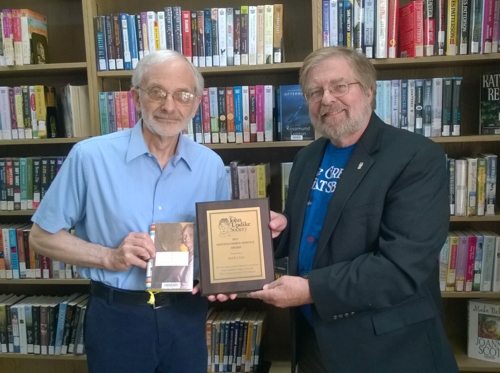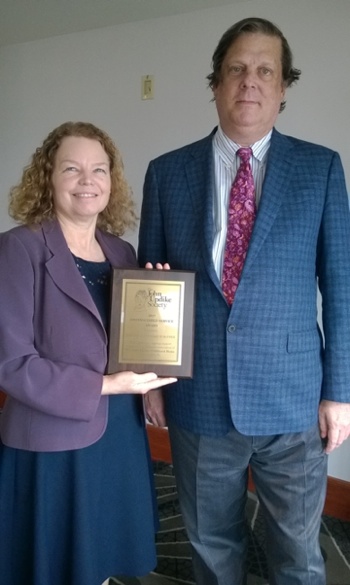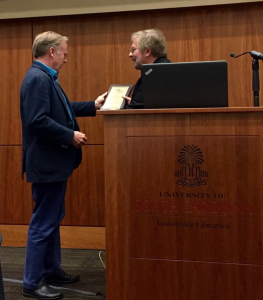Every two years, The John Updike Society holds a conference at a site with an Updike connection to celebrate the literature and legacy of the Pulitzer Prize-winning writer. For every conference, the society awards competitive Schiff Travel Grants to scholars to enable them to attend the conference and share their work on Updike. The grants are made possible by a generous donation from The Robert and Adele Schiff Family Foundation. Under-40 recipients receive $1500, while the award for Member recipients is $1000. This year’s six awardees are the most diverse that the society has sponsored to date:
Townes Fricke (U.S., under 40) is a high school senior who is applying to colleges and already looking ahead to graduate school, where he hopes to focus on how literary biography affects our cultural perceptions of writers. A writer himself, he wishes to become an academic “without being pretentious about it.” Fricke also will be a speaker at the upcoming Roth @ 90 conference and is currently working on an essay collection on the history of the “Great American Novel.” At the Updike conference in Tucson he will present his paper on “Growth is Betrayal: John Updike’s Work through the Lens of His Peers.” The title is taken from a line in Rabbit Redux, and the peers that Fricke will focus on are John Cheever, Philip Roth, and Norman Mailer.
Nemanja Glintić (China, under 40) is an assistant professor of Serbian language and literature at the Faculty of European Languages and Cultures of the Guangdong University of Foreign Studies in Guangzhou, China. Currently he is a Ph.D. candidate whose dissertation focuses on the family novels of Updike and Serbian writer Danilo Kiš—two authors he deeply admires. Updike and Kiš met in Belgrade in 1978, and Kiš was the only Yugoxlav writer Updike read and publicly spoke about. The paper Glintić will present at the conference, “The Nascent Artists: John Updike’s Peter Caldwell and Danilo Kiš’ Andreas Sam,”comparatively analyzes Updike’s protagonist from The Centaur and a character from two books from Kiš’ family trilogy, The Family Circus—the novel Garden, Ashes and the short story collection Early Sorrows.
Biljana Dojčinović (Serbia, member) is a full professor at the Department for Comparative Literature and Theory of Literature, Faculty of Philology at the University of Belgrade. She has been a member of The John Updike Society since its founding and a member of The John Updike Review editorial board since its inception. A board member since 2014. Dojčinović directed the 5th Biennial John Updike Society Conference (2018) in Belgrade—the first JUS Conference outside U.S. Dojčinović has published seven academic books, among them the first and so far only monograph on Updike in Serbian, Cartographer of the Modern World (2007), as well as numerous articles on Updike, in both Serbian and English. In the paper she will present in Arizona, “Dedalus and Caldwell: Joyce in Updike’s The Centaur,” Dojčinović argues that the Joyce influence in The Centaur extended beyond Ulysses.
Carla Alexandra Ferreira (Brazil, member) is Associate Professor of American Literature at the Federal University of Sao Carlos. In 2014 she taught at the University of Iowa as a Fulbright Visiting Scholar and later earned a Ph.D. at the University of South Carolina under the supervision of Updike scholar Don Greiner. She is the author of North and South Readings: perceptions of oneself and the Other in Updike’s Work (2018) and various articles and book chapters on Updike and other writers from the U.S. and U.K. She has also advised theses and dissertations on Updike and American authors and has been a member of the society since 2014. More recently she has been working on a book about Updike’s New Yorker fiction and has an essay forthcoming in The John Updike Review. In Tucson she will present a paper on “Brazilians on Brazil (1994): the novel’s reception in the South American Country,” in which she explains why Brazilians reacted as they did and what critics could not see when they first read Updike’s novel.
Sue Norton (Ireland, member) is a lecturer of English in Technological University Dublin. With Laurence W. Mazzeno she co-edited and contributed to Contemporary American Fiction in the European Classroom: Teaching and Texts (Palgrave Macmillan, 2022) and European Perspectives on John Updike (Camden House, 2018). Her work on writing and literature has appeared in Critical Insights; The Journal of Scholarly Publishing; The Explicator; The Irish Journal of American Studies; and The John Updike Review. She has presented papers on John Updike’s work at several John Updike Society conferences and at two American Literature Association conferences. The paper she will present in Tucson is “Pruning the Self and Asserting Identity in ‘A Desert Encounter,” in which she posits that Updike’s multifaceted authorial presence—celebrated American author and affable American retiree—works to assert individual identity, a positing of authorial presence as a kind of retort to Roland Barthe’s idea of the writer as mere scripter, devoid of true essence.”
Pradipta Sengupta (India, member) is an associate professor of English at M.U.C.Women’s College, Burdwan, West Bengal. He wrote his Ph.D. on “The ‘Hawthorne Novels’ of John Updike” at the University of Burdwan and also completed a postdoctoral project on “Recasting Contemporary America: A Study of John Updike’s Rabbit Tetralogy” while a research fellow at Osmania University Center for International Programs, Hyderabad. Since then he has published on Keats, Hawthorne, Tagore, Dickens, Frost, Carey, Heller, Yeats, Emerson, and Updike, with his main areas of interest continuing to be American fiction and Indian poetics. In Tucson he will present “Yoga and Tantric Love: Inadequacy and Futility in Updike’s S.” Set against the backdrop of Arizona desert, S. details the activities of a Hindu ashram and its sham hypocritical guru, the Arhat, who expoits and uses the idiom of both Patanjali Yoga and Tantric Love to indulge in his carnal exploits wth ashram women. A close reading suggests that Updike himself abuses the principles of Pantanjali Yoga and Tantric Love, to the detriment of the novel.
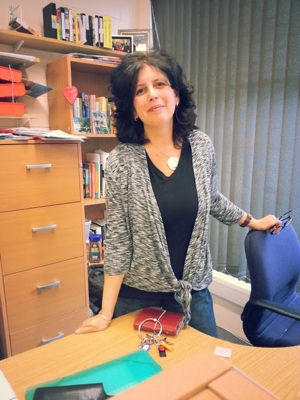 The selection committee for the John Updike Tucson Casitas Fellowship has chosen Dr. Sue Norton, Lecturer of English in the Faculty of Arts and Humanities at Technological University Dublin, to serve as the first fellow in residence.
The selection committee for the John Updike Tucson Casitas Fellowship has chosen Dr. Sue Norton, Lecturer of English in the Faculty of Arts and Humanities at Technological University Dublin, to serve as the first fellow in residence.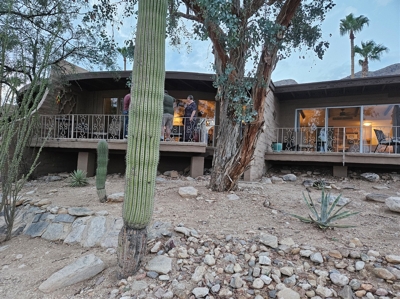 Laurence W. Mazzeno: Contemporary American Fiction in the European Clasroom: Teaching and Texts (Palgrave Macmillan, 2022) and European Perspectives on John Updike (Camden House, 2018). Norton came to Updike studies through her doctoral work on family in contemporary American fiction, which she completed in 2001 at University College Dublin. Her first article on Updike (The John Updike Review, 2014) was on the “regulating daughter” in the Rabbit novels. She has maintained an interest in the treatment of girls and women in Updike’s writing and beyond. It is on this topic that she will focus during her residency as the 2024 Fellow at the Tucson Casitas.
Laurence W. Mazzeno: Contemporary American Fiction in the European Clasroom: Teaching and Texts (Palgrave Macmillan, 2022) and European Perspectives on John Updike (Camden House, 2018). Norton came to Updike studies through her doctoral work on family in contemporary American fiction, which she completed in 2001 at University College Dublin. Her first article on Updike (The John Updike Review, 2014) was on the “regulating daughter” in the Rabbit novels. She has maintained an interest in the treatment of girls and women in Updike’s writing and beyond. It is on this topic that she will focus during her residency as the 2024 Fellow at the Tucson Casitas.


